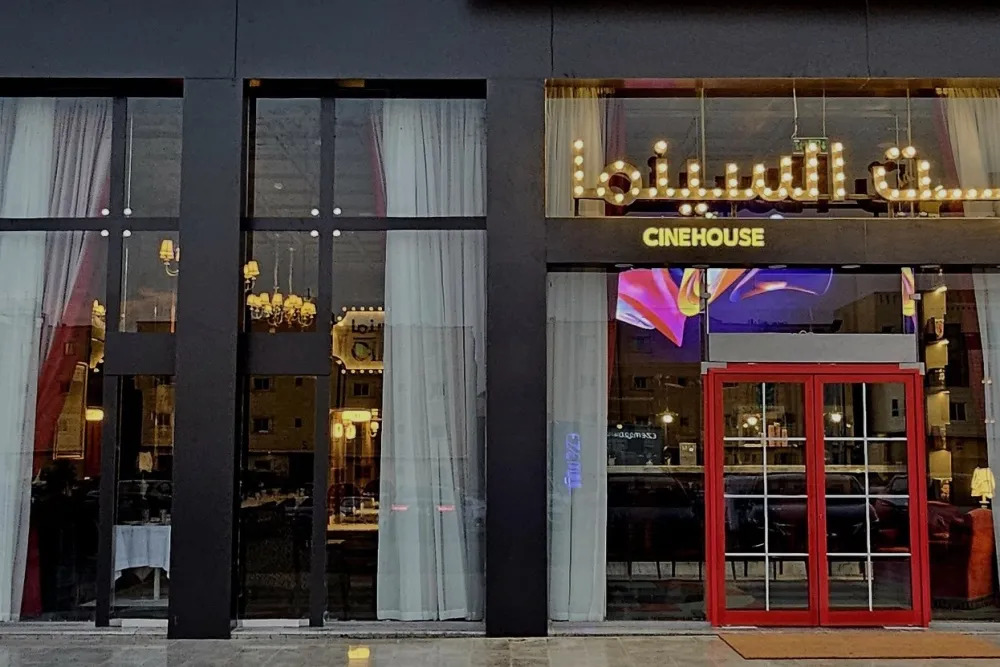
According to the entertainment portal "Variety," an art cinema named "Cinehouse" is set to open later this month in Riyadh, the capital of Saudi Arabia. This is destined to become yet another milestone in the history of film development in the kingdom since it lifted its 35-year movie ban at the end of 2017.
Reportedly, the cinema boasts luxurious facilities equipped with 4K laser projectors and an Atmos 7.1 sound system, but it follows the smaller art house model, with three lavish screening rooms collectively offering only 80 seats. The opening film has been scheduled to be the 1975 documentary "Development of Riyadh City" by Saudi director Abdullah Al-Muheisen.

Exterior view of the "Cinehouse" art cinema in Saudi Arabia
Born in 1947, Abdullah studied philosophy and film in the UK during his youth. Upon returning to his home country, he produced a number of documentary and fictional works that depict the transformation of the Middle East. However, due to historical reasons, Saudi Arabia tightened its cultural policies in the 1970s and 1980s, leading to the gradual closure of cinemas. For 35 years, from 1983 to 2018, there were no operational commercial cinemas in the country, and when there was a must-see film, it was only shown in projection format in large auditoriums. Consequently, not only were Abdullah’s films unavailable, but even globally renowned Hollywood films were out of reach for the average Saudi citizen during that era.
Although cinemas vanished for 35 years, the Saudi film industry has been developing slowly. In 2006, the first commercial film was produced, and the first female actor made her on-screen debut. Gradually, films began to be showcased and competed at festivals like Venice and Berlin, and a film was even submitted for the Oscar for Best Foreign Language Film.
On April 18, 2018, history was rewritten with the grand opening of the first cinema in Riyadh in 35 years, screening the Marvel blockbuster "Black Panther." Since then, the development of the Saudi film industry has accelerated rapidly. In April 2019, the Saudi government announced a $35 billion investment in cinema construction; in 2021, the inaugural Red Sea International Film Festival was held in Jeddah; and in the same year, the newly established Saudi Film Commission announced plans to position Saudi Arabia as a world-class film center, aiming for a $500 million film industry revenue.
Now, six years have passed since Saudi Arabia reopened its cinemas. Although the notion of a world-class film center still has a long way to go for the kingdom, the establishment of an art cinema reflects the determination of both government officials and industry professionals. The operator of “Cinehouse” is Faisal Baltyuor, a 1987-born Saudi film producer, who returned to his home country after studying film in Australia. He founded a film company and has produced dozens of Saudi films over the past several years. Two years ago, he also launched the first professional film magazine in Saudi Arabia after the lifting of the film ban.
This time, in addition to the opening film "Development of Riyadh City," the initial lineup planned for “Cinehouse” includes last award season's hit film "The Guilty," Finnish director Aki Kaurismäki's new work "Fallen Leaves," the Hollywood film "Joker," the Korean movie "The Outlaws 2," and the Iranian film "Gold Leaf." These diverse selections are sure to attract Saudi audiences eager to see quality international films on the big screen.
In a publicly released statement, Faisal pointed out that while Saudi box office revenue has grown rapidly over the past six years, "we still see a significant gap in the art cinema sector. We understand that establishing an art cinema comes with a myriad of challenges, so we hope to proceed gradually and see if we can build such a community in Saudi Arabia."
Faisal stated that the “Cinehouse” art cinema project took two years of preparation and received strong support from the Saudi Ministry of Culture and the Saudi Cultural Development Fund. According to data from the Saudi Media Regulatory Authority, from April 2018 to March 2024, there were over 61 million moviegoers in the kingdom, averaging about 10 million per year. Given that the total population of Saudi Arabia is over 36 million, this is considered quite an achievement; in the entire Middle East, it stands out as a new leader in the film industry.


